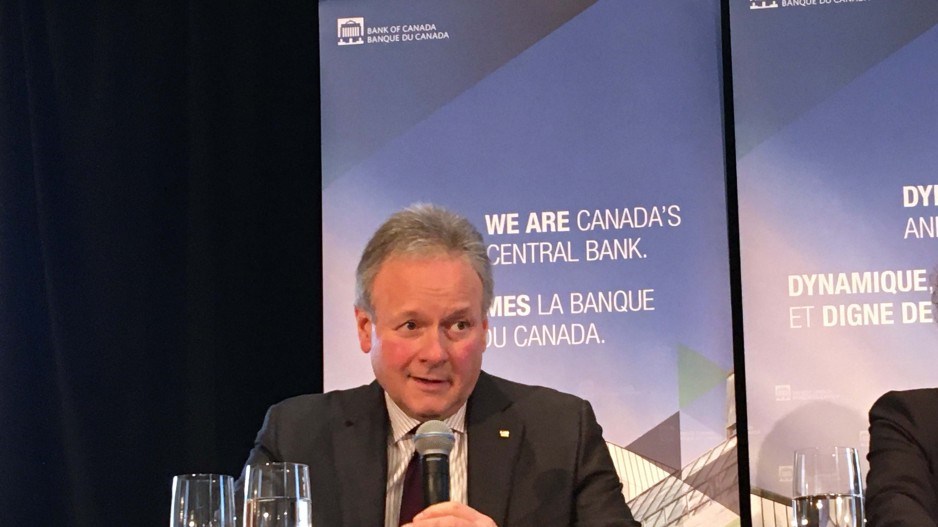What happened: Bank of Canada governor Stephen Poloz visited B.C. to address the Greater Vancouver Board of Trade
Why it matters: The outgoing central banker took on everything from the housing market to plans for a new $5 bank note
What is a central bank to do when decisions on monetary policy could either exasperate exceedingly pricey real estate markets in Vancouver and Toronto or else go against its own inflation targets?
Bank of Canada governor Stephen Poloz, who appeared at a Greater Vancouver Board of Trade (GVBOT) event in the city’s downtown Thursday (January 9), says finding the right balance for the overnight rate is about staying focused on aggregate data.
“What we’re trying to do is to position all of our analysis on our understanding of the underlying financial vulnerabilities that fuels that conversation. But I can assure you that’s not going to distract us from job one: which is to stabilize the macroeconomy and, through that, to achieve our inflation targets,” he told reporters following a fireside chat with GVBOT CEO Bridgitte Anderson.
“We see the implications for certain housing markets as kind of a side effect of that primary mission. So it can play a role at the margin, it can play a role if there’s a consistency between what may be desirable for those [Vancouver and Toronto] housing markets’ point of view and the macro question that we face.”
A potential hike to the overnight rate could cool demand for housing in Vancouver, while the ensuing access to cheap credit that would come from a rate cut could reignite the market.
But during a speech ahead the fireside chat, Poloz said the household debt that results from strong housing activity continues to be “Canada’s biggest financial system vulnerability.”
“The good news is that with the B-20 guideline working to reduce the riskiest borrowing, we are confident that the stock of household debt is becoming less of a threat over time,” he said, referring to the mortgage stress test introduced by Ottawa almost exactly two years ago.
He later expanded on that for reporters, noting housing markets outside Vancouver and Toronto haven’t experienced corrections as a result of the stress test.
“And so it’s hard to argue that B-20 is the thing that’s holding back the housing market. It’s not holding it back in all the other markets that have B-20,” he said, adding he believes the stress test has helped dampen speculative behaviour in the Vancouver and Toronto markets.
Numerous times throughout his speech, fireside chat and remarks to reports, Poloz highlighted the central bank’s concerns over global trade uncertainty.
“This has been a pressing concern for the past three years. The impact of protectionist actions and uncertainty about what might come next continues to hold back exports and investment globally,” he said during his speech, adding ratification of the Canada-U.S.-Mexico free trade agreement (CUSMA) will help ease some of that uncertainty for domestic firms.
“Plenty of uncertainty remains around the implications of the U.S.-China agreement for Canadian exports and around whether any more of the new tariffs can be rolled back. Some are concerned that the next step will be for the U.S. administration to take similar trade actions against the European Union. It is understandable that companies are reluctant to make big investments in this setting.”
After discussing how global uncertainties have become a more significant factor for the central bank, Poloz cast his eye on the domestic landscape to express concerns about interprovincial trade barriers.
“We could actually have free trade within Canada. What an amazing concept. By the way, that’s the reason why we did confederation,” he said.
“Then we’ve got this silly interpretation of the legal words and mumbo-jumbo that somehow makes it OK to have un-free trade within Canada.”
The Bank of Canada governor went on to cite a 2019 study from the International Monetary Fund that estimated the country could increase GDP per capita by about 4% if it completely liberalized the free movement of goods between provinces.
“That’s just free money lying there on the sidewalk and everybody’s refusing to pick it up,” Poloz said.
“It’s outrageous that we allow that continue — put all that energy into negotiating international trade agreements and not come to our senses domestically.”
Right before Poloz speech the Bank of Canada announced plans for a new $5 banknote that would include public consultations, similar those that led to the selection of Viola Desmond for the $10 note.
“This time we will be asking all Canadians to nominate any historic Canadian—someone who is truly banknote-able,” he said.




